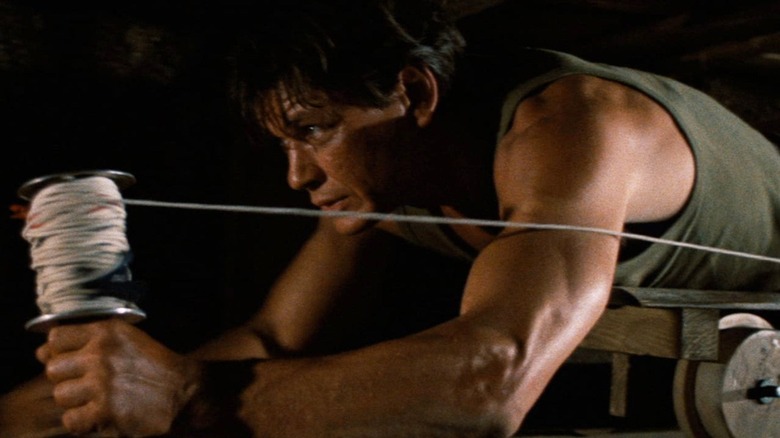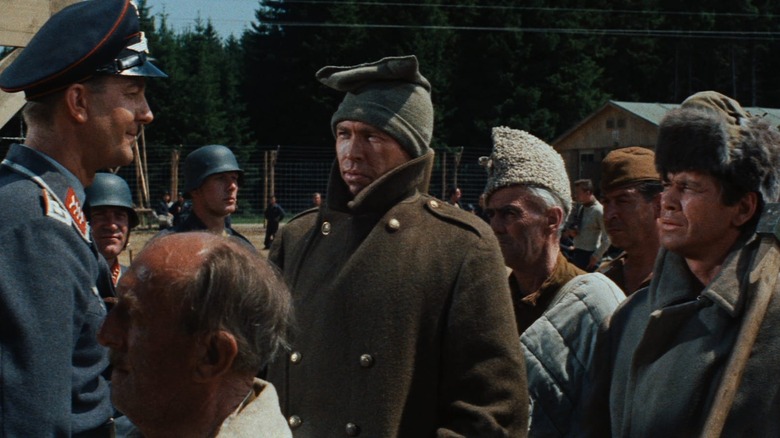John Sturges Wanted The Great Escape To Show Charles Bronson's Softer Side
When John Sturges embarked on a mission to adapt Paul Brickhill's 1950 memoir detailing a mass prisoner getaway from a German POW camp, it was a challenge from the jump. What would become one of the most beloved American war movies, and one of the great prison escape movies, ended with few successfully making it to freedom. "The Great Escape" was a high-grossing movie upon its 1963 release, edging out Alfred Hitchcock's creature feature "The Birds" with an $11.7 million box office return. Before all that, though, "Bad Day at Black Rock" director Sturges endured multiple hurdles, which would begin with an exhaustive casting process.
The story of "The Great Escape" follows a core group of Allied POWs in 1944 as they plot the escape of over 250 prisoners from the high-security German prison Stalag Luft III. It was a great opportunity for an ensemble cast, something Sturges had experience with, most famously by directing the Akira Kurosawa remake "The Magnificent Seven." That 1960 western was filled with charismatic principal actors, including a handful that he would bring back for "The Great Escape": the steely-eyed Steve McQueen, the rugged James Coburn, and brawny tough-guy Charles Bronson were among them. The latter would play an Irish-Mexican gunfighter in "The Magnificent Seven," but cast against type — Sturges wanted to explore Bronson's softer side.
Brian D'Ambrosio's book "Menacing Face Worth Millions: A Life of Charles Bronson" made much of Sturges' casting instinct, and quotes the director's thoughts on Bronson as saying, "Charlie as a rough, tough guy didn't interest me." D'Ambrosio goes on to say that it was Bronson's "tender interior" that inspired Brickhill to cast him in a whole new way, as the highly claustrophobic Danny, the tunnel king of "The Great Escape."
Burly Bronson
The Lithuanian-American Charles Bronson's stiff-jawed roughness was a draw for filmmakers, and would come to characterize his celebrated roles in the likes of Sergio Leone's epic "Once Upon a Time in the West" and the "Death Wish" movies. His brawniness was so influential that an infamous criminal named himself after the actor (Nicholas Winding Refn chronicled it spectacularly), and Quentin Tarantino's "Reservoir Dogs" dedicates some praise to his performance in "The Great Escape."
Flight Lieutenant Danny "The Tunnel King" Welinski is a tender spot in Sturges' war movie, a low-key echo of Bronson's yearning and pining gunslinger of "The Magnificent Seven." An emigré from Nazi-occupied Poland, Danny makes his way to England to bring the fight right back to the Germans. There's little shame in his multiple captures by the Nazis, but much pride in the 17 escape tunnels he digs over the war. His experience makes him the point man for engineering the underground getaway on each of the camp's three tunnels, so-named Tom, Dick, and Harry. Such experience wasn't without adversity; the threat of tunnel collapse keeps Danny wildly claustrophobic, a fear that former child coal miner Bronson could draw upon from his own life. Watch him in action:
Bronson's stiff upper lip provides some counterbalance to his touching moments; Sturges used Bronson's sobering line delivery for one of the funniest punchlines in the entire film.
Ultimately, Danny's efforts alongside fellow tunnel king Flight Lieutenant Willie Dickes (John Leyton) lead to the perimeter breach of 76 men. Bronson would continue to have memorable roles in Euro-westerns and American war movies like Robert Aldrich's "The Dirty Dozen," finally finding international stardom in the 1970s. Don't let the vulnerable roles fool you, though; he's still Charles freakin' Bronson.

